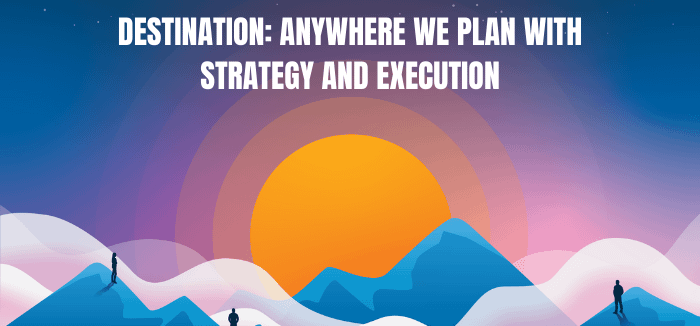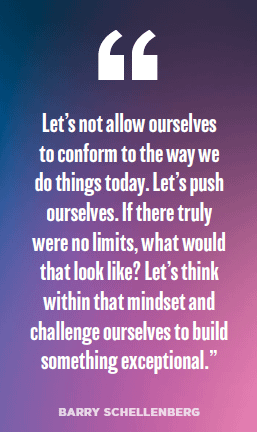
In November 2020, nearly nine months into a global pandemic that shook the household goods and moving industries to their cores, Barry Schellenberg, President and COO of Atlas® Van Lines, had an idea.
From the financial, service, and staff engagement perspectives, the van line had reacted as strongly as possible to the pressures caused by COVID-19. And once they were able to stand firmly on less shaky ground and stop focusing solely on the present, Schellenberg thought, “OK, what next?”
“We had our top talent with us, and we’d all been through this momentous time together, so we had to ask ourselves what our focus should be. What the most important thing was,” says Schellenberg. “We needed to come together to find that focus and get better traction and a better execution value.”
And find it they did.
GET YOUR MOTOR RUNNIN’...
Before coming stateside, Schellenberg led Atlas® Canada, joining the organization at a time they had suffered a significant customer loss that hit revenues hard. To course-correct, Schellenberg employed a strategic planning device developed by thought leaders Robert Kaplan and David Norton called the Balanced Scorecard. The tool provides business leaders with four strategic imperatives, each valued at 25%: Learning and Growth, Internal Business Processes, Customer, and Financial.
By using the structure of this scorecard and infusing it with the overall mission and vision of Atlas® World Group, strategic priorities for that subsidiary were able to be set and executed upon—ultimately leading to positive results in Canada at both the corporate level and throughout their Agent network.
When Schellenberg came to Atlas® Van Lines in early 2020, he and his teams (and every other team across the organization) were met head-on with the biggest challenge they’d ever faced. Once the dust began to settle a bit later that same year, Schellenberg knew what he needed to do, and how he needed to do it. His next step was to assemble the right team to create and develop what would eventually become the Atlas® Van Lines & Agency Family Strategic Roadmap.
At headquarters, three of the major players from senior leadership were Mary Beth Johnson, Vice President of Atlas Van Lines Corporate Marketing and Avail Move Management®; David Smith, Vice President and Chief Information Officer for Atlas Van Lines; and Ryan McConnell, Vice President of Strategic Planning for Atlas Van Lines. All three hit the ground running with their teams to help Schellenberg—plus other senior members of leadership at Atlas Van Lines including Jeff Schimmel, Vice President of Transportation Services, Brenda McCandless, Senior Director of Claims Services, Vonda Walker, Senior Director of Rating and Distribution Services, and Jason Kempf, Corporate Controller—create a tangible plan that would help propel the van line even further.
“I felt lucky to be involved from the ground floor of the Strategic Roadmap,” says Johnson. “It was the perfect means of getting the team—be it internally here at headquarters or within our Agent family—to be in alignment on who we are and what is at the core of what we want to accomplish. As long as we keep our North Star in mind through Vision 2025 and this plan, no matter what decisions we make, if it doesn’t fit within the Strategic Roadmap we can ask ourselves, ‘Why are we doing this?’”
HEAD OUT ON THE HIGHWAY...
Initially, the leadership team sat down and did much of the initial work themselves, but for all of their well-earned expertise, they knew they couldn’t do it in a silo. To truly get the entirety of the van line and the Agents on the same page, they needed to seek out as much valuable insight as possible.
“We recognized the opportunity to step back, take it to our leadership teams and the Agents involved in our RSG (Relocation Services Group) Strategic Committee, and allow them to have input into it as well,” says McConnell. “After that we did one-on-one meetings with each of the Agents involved on that committee to get their responses and feedback. We did that intentionally because we wanted to make sure first and foremost that what we felt as a management team was what they felt as Agents so we could have shared objectives, a shared mission, and a shared vision.”
During the development period—which took roughly eight months—the Strategic Roadmap team took the Balanced Scorecard and began to customize each of its four quadrants with words and phrases that held true meaning for the van line, specifically, says Johnson. “We spent countless hours figuring out what the right words were, because one word could really resonate differently between different people. I don’t think we’ve looked at a thesaurus more in our lifetime! But it was a critical, key element to get them as tight as possible, so they spoke broadly enough at a high level, but still resonated with the core meaning and hit home.”
From Smith’s perspective, he was able to pose one of the most important—and too often overlooked—questions that help shape documents like this. “As the newer guy in the group, I got to keep asking ‘Why?’ Why do we do it this way? Why can’t we do it that way? Why? I think, or at least hope that helped create some interesting discoveries for us.”
With some minor tweaking of Kaplan and Norton’s Balanced Scorecard formula (Learning and Growth became People, and Internal Business Processes was simplified to Internal Processes), and the final selections of the descriptive imperatives that would round out each of the quadrants, the team was able to set their Priority Initiatives, says McConnell. “Each of the seven Priority Initiatives was chosen and designed to support Vision 2025, the Balanced Scorecard, and the mission and vision of Atlas. They were selected based on management and Agent input to make sure we were focusing on the right items at the right time.”
- Containerized Service Solutions will focus on finding small-shipment solutions— like SimpliCity™—to stay competitive in the marketplace as moving trends shift toward smaller moves in certain sectors.
- Revenue Diversification is a path toward growing product lines that support the private client side of business, while continuing to be the best-in-class provider for corporate and military clients.
- Safety & Risk Mitigation has always been at the forefront, but moving forward, Atlas will invest in technology and training solutions that mitigate risks, reduce legal exposure, and drive down insurance premiums.
- Maximize Agent Prosperity was a no-brainer because everything Atlas does is done to bring value to the Agent family and support them in any way possible to ensure their prosperity and sustainability.
- Simplified Distribution will make Atlas’ process from a revenue distribution standpoint simpler, easier to understand, and more consistent at the client, Agent, and corporate levels.
- Agile Pricing Strategy allows Atlas to become adaptive in the marketplace, and lets them react to market pressures, outside costs, and supply-and-demand impacts in a streamlined, informed manner.
- Digital Transformation is the direct line to the future of the industry, and by identifying pain points and open doorways within business processes, Atlas can discover the right technology tools to maximize those opportunities for today’s—and tomorrow’s—customer.
“Even at that five-year mark we may not achieve all of our initiatives,” says Schellenberg, “but there’s no finish line. Digital Transformation will never end because it is ever-evolving. The same goes for things like Safety & Risk Mitigation. But some are meant to change over time to keep ourselves relevant.”
LOOKING FOR ADVENTURE IN WHATEVER COMES OUR WAY.
Now that the Strategic Roadmap team is ready to share their plan with the broader Atlas® Van Lines family, they are enthusiastic to see where it can take them—without limits.
“I’m really excited because I think I’ve walked into Atlas® at the perfect time,” says Smith. “Our industry has always kind of done things one way, but Atlas is ready to ask the hard questions and effect the changes needed to make leaps and bounds into the future of the industry by breaking down the mindset of ‘this is how it’s always been done’ and carrying a limitless approach into everything we do.”
For Johnson, she’s been excited by the early response they are receiving from Agents, noting that some have reached out to say they want to adopt the roadmap to create new strategies for their businesses. This signals to her that, as they hoped would happen, they are all thinking on the same page. She adds that it’s also been a huge help to the marketing team, saying, “There isn’t a day that goes by where we don’t say, ‘Get the roadmap out.’ It shows us what fits and what doesn’t. Several months ago, some of these words and phrases weren’t even in our lexicon. Now, with everything we put out, there is something built in that is weaved in from the Strategic Roadmap. It’s all connected.”

As to the “Without Limits” philosophy Atlas is adopting, McConnell agrees that it’s already providing the focus and commitment for which it was intended. “When you look at this roadmap, it becomes your culture. These pieces are the mindset of our company. As we continue to execute against it, we’ll do so with great timing and by mining input from our Agent network and customers. It just comes with a whole different approach than we’ve taken before and will evolve us into a stronger, more sophisticated company. If we put our mind to it and don’t ignore the opportunities in front of us, there’s no limit to where we can go,” he says.
In addition to the positive reaction from Agents, Schellenberg shares that when he rolled out the Strategic Roadmap at a recent town hall, his peers from other subsidiaries also showed interest in using the structure of the tool to create plans for their own teams.
“I think people see the logic in it,” Schellenberg says. “The logic that we have what is most important to us on a one-page document and that it will help us know if we are executing and where resources truly need to go to improve. Plus, there is measurement behind this roadmap—so there’s nowhere to hide. I’m excited that it could become a common tool everyone across Atlas® World Group can use.”
Schellenberg points out that while the document has guideposts, it still offers room for flexibility and individuality so that whoever uses it to remove limitations and interpret it for themselves can do so in the most valuable ways possible.
“It’s about challenging ourselves to think about performing our business in a different way to get new results. And defining those results depends upon the perspective you have. It could be efficiency, experiential, or an easier process for employees. Let’s not allow ourselves to conform to the way we do things today. Let’s push ourselves. If there truly were no limits, what would that look like? If we were starting this business from scratch today, if it didn’t exist, how would we do that in the year 2022 without having any of the history and experience we’re lucky enough to have? Let’s think within that mindset and challenge ourselves to build something exceptional.”




